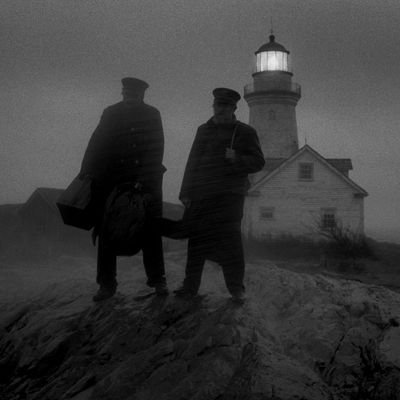
This review originally ran in October 2019, in the before times. We are republishing it now that The Lighthouse is available to stream on Amazon Prime from quarantine.
Every fart rings out like a gunshot in The Lighthouse. Robert Eggers’s new movie, a thriller set in the late 1800s, doesn’t aim for body horror. But it is about the horror of bodies, bodies that have been placed in forced proximity to one another for an interminable stretch of time. The sound of a casual piss reverberates through the house that the main (and only) two characters split. The contents of a chamberpot get blown back in the face of the person trying to empty it, giving him a revolting reminder that, hey, everyone poops. That same character, a young man named Ephraim Winslow (Robert Pattinson), narrowly avoids getting hit in the face with jizz when he stumbles onto his more senior colleague in lighthouse keeping, Thomas Wake (Willem Dafoe), getting a little too intimate with the lamp. Not that Winslow is in a place to judge anyone’s stroke material, no matter how odd — when he seizes a moment to himself to furtively jerk off, his masturbatory aid of choice is a crudely carved mermaid figurine.
Winslow and Wake couldn’t get away from each other if they tried. They’ve been assigned to a four-week stretch on a tiny, inhospitable island that consists of little more than the title structure, the adjoining building in which they both reside, and a signal house from which a foghorn blares. The two men, strangers who’ve only just met, share a bedroom, and in the evening they share a meal over a cramped table. Even the frame is confining; the film is shot in an aspect ratio only slightly wider than a square. The darkness at its corners feels like it’s eating away at the limited amount of space the characters have to occupy. The Lighthouse is such an effective exercise in projecting claustrophobia, in both a physical and psychological sense, that it’d be unbearable to watch if it weren’t so funny. Thankfully, it’s a scream. Pry away the historical trappings, the remote locale, the maritime-tinged language and the building hallucinations, and what you have is a story about roommates getting on each other’s nerves in grandiose fashion.
Eggers made his splashy debut in 2015 with The Witch, a genuinely unsettling horror story about a colonist family that managed the difficult trick of depicting not just Puritan life but Puritan thinking, settling itself into the mind-set of characters who didn’t just believe in the devil but believed the devil to be as imminent a threat to their precarious existence as failed crops or a bad winter. The Lighthouse is another old-timey effort, and like The Witch, it’s exacting in its period details while also feeling insistently lived in — you can sense how bad the men must smell as they pull their work clothes over the union suits they never seem to take off. To say The Lighthouse isn’t as good a film as The Witch feels both accurate and a little unfair, if only because the aims of The Lighthouse, which Eggers wrote with his brother, Max, are so much more modest and silly. It has more in common with the gleefully eccentric work of Guy Maddin than anything that sets out to scare. It’s about two men who might be harboring dark secrets that are eating them up inside but who really end up destroying each other over their inability to establish personal and professional boundaries.
At the core of the film is Pattinson’s impressively committed performance as the taciturn Winslow. As Wake, Dafoe gets to start big and just bend what he’s doing around the warps in the film’s reality. But Winslow’s is the point of view from which the film takes place, that of a greenhorn who discovers his co-worker is an irrational taskmaster by day and a garrulous alcoholic at night and equally demanding in both roles. Pattinson, whose face looks even more angular when photographed in black and white, has to navigate a slow build while scarcely talking at all. For a long stretch of the film, Winslow’s most overt displays of emotion involve not Wake but an aggressive seagull that won’t leave him alone. Dafoe may be a delight as a sea-brined gremlin with a bottomless thirst and a surprising sensitivity about his own cooking (“Yer fond of me lobster,” he howls at one point. “Say it!”). But it’s Pattinson, playing the straight man, who sells the slow deterioration of the pair’s mental state. Winslow vacillates between grounded moments and ones in which any sense of rationality or time passing slip away — his brooding guilt barely able to compete with his roiling irritation at having to listen to Wake tell one more rambling anecdote.


